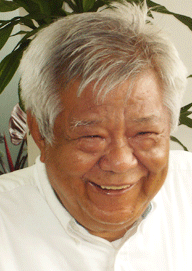Tin Moe
Tin Moe | |
|---|---|
 U Tin Moe | |
| Born | Ba Gyan November 19, 1933 |
| Died | January 22, 2007(aged 73) Los Angeles, California |
| Alma mater | University of Mandalay |
| Occupation | Poet |
U Tin Moe(Burmese:တင်မိုး;MLCTS:tangmui:;[tɪ̀ɰ̃mó]) (1933-2007) was aBurmesepoet.
Early life
[edit]Tin Moe(Maung Ba Gyan)was born in the village of Kanmyè inTaungtha Township,Myingyan,Mandalay Division. He received his early education at aBuddhistmonastery, and attended school at the town of Yezagyo. His reputation preceded him when he went on to study at theUniversity of Mandalayat the request offaculty memberswho had been impressed by an essay he wrote for thematriculation exam. He was already a published poet under thepen nameKan MyèNan Myint Nwe in theLudu Journalof Mandalay.[1]
Fame
[edit]In 1956 Tin Moe collected his poems into a book titledHpan Mee Ain(English:The Lantern). It won him the NationalLiterary Awardfor Poetry in 1959. He continued to write poems and essays, and became editor of poetry at theLudu Dailyin Mandalay.[1]He also worked for a time as the editor ofPei Hpu Hlwarmagazine.
His early poems were influenced byMin Thu WunandZawgyi,who in their time pioneered a new ageliterary movementwhile still atRangoon University.[2] They also inspired him to write poems for children. Some of these were later turned into songs for children and also included in school texts.[3]
Politics
[edit]Thepolitical upheaval of 1988 in Burmawas a turning point in Tin Moe's life. He responded to the criticism of the political content of his later poems such asSobsandNew Pagesby referring toThakin Kodaw Hmaingwhose patriotic and satirical poetry spawned a powerfulanti-colonialliterary movementwhile Burma was underBritish rule.He had dedicated one of his earliest poems to his great hero, titledTo Grandpa Thakin Kodaw Hmaing.[3][4]
An active supporter of thepro-democracymovement, Tin Moe was imprisoned in 1991 for four years byBurma's military governmentfor his activities. His work was banned, and after his release he left for the West and moved to theUnited Statesas an exile.[1] He traveled through the U.S.,Europe,Japan,andSoutheast Asiaattending literary events. In 2004, theNetherlandshonoured him with thePrince Claus Award.
He died on January 22, 2007, in his home away from home inLos Angeles, California,at the age of 73.[5]
Notes
[edit]- ^abcTin Maung Than (January 1, 2001)."An Auspicious Moment".The Irrawaddy.Retrieved2007-03-22.
- ^"Tin Moe".Words Without Borders.
- ^abKhin Maung Soe (April 3, 2007)."The" Great Guest "of Burmese Literature".The Irrawaddy.Retrieved2009-02-21.
- ^"Interview with Tin Moe inc. poems".Burma Debate, courtesy ofRadio Free Asia,September 2000. Archived fromthe originalon 2008-09-30.Retrieved2009-02-21.
- ^"Friends, colleagues remember great poet Tin Moe".BBC News,January 2007.Retrieved2007-03-22.
External links
[edit]- Tin Moe's Works in BurmeseMoeMaKa Media
- Yindèga gabyaPoems from the Heartby Tin Moe, in Burmese, September 2000 to March 2006,New Era Journal
- Tin Moe misses the sound of BurmeseThe Power of Culture,Prince Claus Fund,2004
- Burmese Legendary Poet Tin Moe DiesVOA News,24 January 2007
- Poems by Tin Moe (1933 - 2007)Prince Claus Awards
- Brief biographyPrince Claus Awards
- The Shut Door- Poem by Tin Moe translated by Win PeMoeMaKa,January 15, 2009
- 1933 births
- 2007 deaths
- Burmese emigrants to the United States
- Burmese writers
- Burmese male poets
- People from Mandalay Region
- Burmese exiles
- Burmese prisoners and detainees
- Prisoners and detainees of Myanmar
- Burmese democracy activists
- 20th-century Burmese poets
- 20th-century male writers
- Mandalay University alumni
